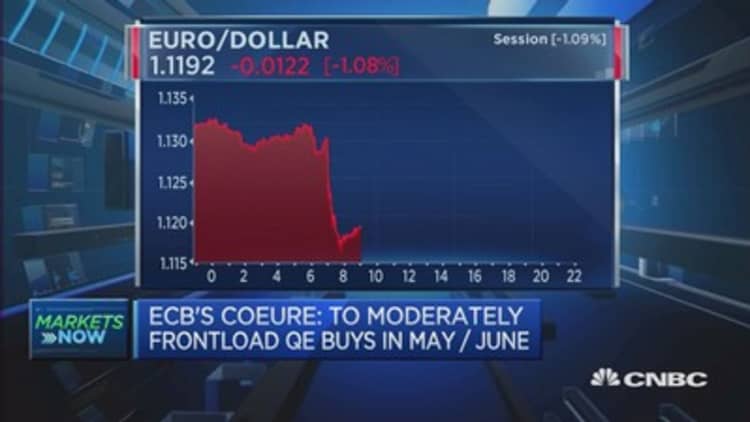
Asset markets were jolted into life on Tuesday morning following dovish comments by an executive member of the European Central Bank (ECB).
Euro zone bond yields fell and the single currency lost over 1 percent against the dollar in the morning session, after Benoit Coeure, a member of the ECB's Executive Board, hinted that the central bank is ready to "front-load" its current quantitative easing (QE) program.
This would see the ECB buy up more assets and be more aggressive in the near term, which spurred investors into a bout of buying.
The euro plummeted to 1.1173 against the greenback at around 8:00 a.m. London time after starting the session at 1.1314. By midday London time it had trimmed some losses and was trading at 1.1207.
The 10-year benchmark German Bund yield, meanwhile, snapped back to 0.564 percent after closing Monday's session at 0.649 percent but also managed to pare some losses as the session progressed. Bond yields from peripheral countries – like Spain and Italy – were also sharply lower.
Stock markets on the continent were sharply higher, with the German DAX and French CAC seeing gains of around 2 percent.
Even the U.S. market felt the move from across the Atlantic. Longer-dated Treasury yields have ticked higher in recent weeks, pulled along by events in Europe. They also moved in Europe's wake on Tuesday, with the 10-year Treasury yield falling back to 2.2020 percent, down from a figure of 2.2373 percent, and was trading at 2.1897 percent by midday London time.
Read MoreGreek firms making big bucks—despite the crisis
"(We are aware) of seasonal patterns in fixed-income market activity with the traditional holiday period from mid-July to August characterized by notably lower market liquidity," Coeure said on Monday, according to a transcript released on Tuesday morning on the ECB's website.
"The euro system is taking this into account in the implementation of its expanded asset purchase program by moderately frontloading its purchase activity in May and June, which will allow us to maintain our monthly average of 60 billion euros, while having to buy less in the holiday period."
He added that, if needed, the frontloading could be complemented by "backloading" in September, when market liquidity is expected to improve again.
Read MoreRapidity of bond selloff is worrying: ECB's Coeure
Separately, Coeure said that he was concerned at the pace of that the recent government bond market selloff, but indicated that it was normal.
"Benoit Coeure has added his weight to the argument for the Bund (and wider European bond) sell-off to end. The pace of QE will accelerate ahead of the summer lull," Kit Juckes, global head of foreign exchange strategy at Societe Generale, said in a research note.
Robert Kuenzel, euro area economist at Daiwa Capital Markets, said it demonstrated that the ECB was sensitive to market liquidity, with Coeure implying that the quieter summer months were the reason behind the move.
"It should not come as a great surprise: the ECB had already stepped up its buying in the past two weeks," he added.
Follow us on Twitter: @CNBCWorld


